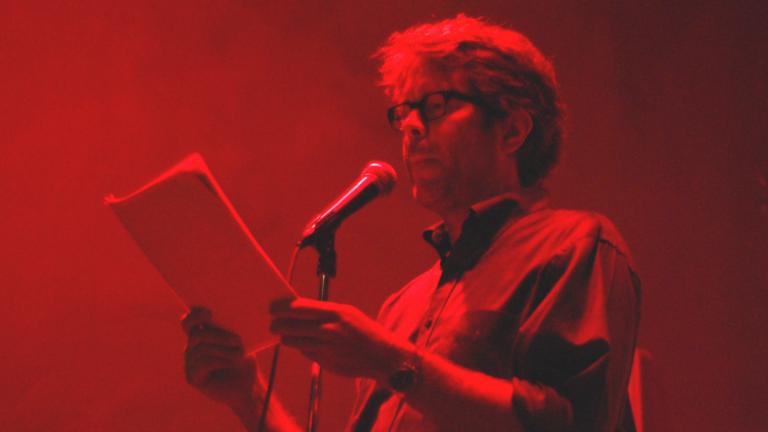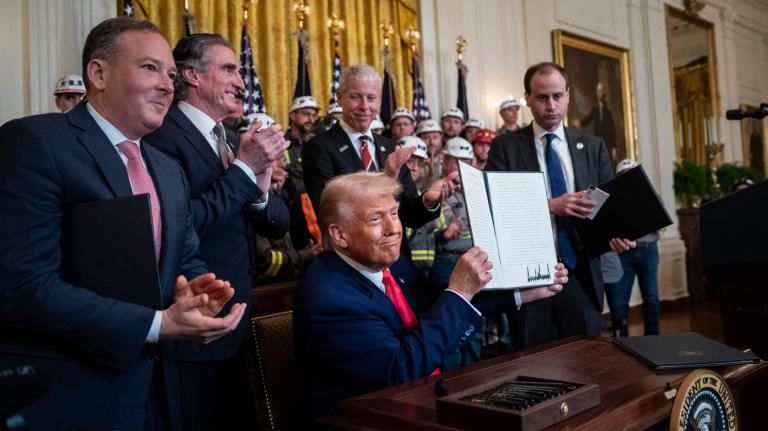The Republican presidential field consists of people who refuse to accept the science of climate change and people who just don’t want to do anything about it. This is partly because the most popular right-wing pundits on Fox News and talk radio, like Rush Limbaugh, attack Republican politicians who do trust the overwhelming scientific consensus. No surprise there, since anti-intellectualism is intrinsic to the appeal of right-wing talk radio.
But what about conservative intellectuals? Do they have anything more to offer? In an attempt to find out, I looked through their op-eds, opinion magazines, and policy journals. I found that most of them fall into three broad categories: those who argue for adaptation instead of trying to stop climate change (the Adapters), the anguished advocates of a carbon tax (the Handwringers), and those who simply deny climate science (the Deans of Denialism).
Carbon taxation is gaining popularity among conservative policy wonks. There are a number of prominent conservative carbon tax supporters, such as former Treasury Secretary Hank Paulson, former Rep. Bob Inglis (R-S.C.), and former John McCain advisor Doug Holtz-Eakin. But notice all the “former”s there — they no longer hold office and no longer hold much sway. They still have a very long way to go in convincing most conservative intellectuals, never mind the movement’s rank-and-file and their elected officials.
For this piece, I focused on public intellectuals, meaning writers and think tank scholars, who are relatively high-profile, who would be cited by other conservatives as well-regarded thinkers, and who are associated with mainstream conservative institutions or large media outlets. I couldn’t include everyone, so apologies to those left out, but these 15 people form a good representative sample.
The Adapters
This group includes sharp, usually younger, wonks, sometimes called “reformicons,” and some emissaries from the big-business establishment wing of the GOP. They basically accept climate science — although many play up the uncertainty of future projections — but they argue that capping or taxing emissions is too costly. Instead, they say we should grow the economy as much as possible so that we’ll have plenty of dough to adapt to climate change, and, some suggest, to offer gigantic rewards to scientists who can invent their way to a climate solution.
- Jim Manzi, senior fellow at the Manhattan Institute and contributing editor at National Review
Manzi is the closest thing reformicons have to a climate expert of their own. He has written extensively on the topic, and he is cited as an influence by many of the other people on this list. “Mr Manzi’s essays on global warming have changed the debate on the issue,” wrote The Economist in 2009. Indeed, Manzi can be credited with giving the smarter, more mainstream conservatives a way of broadly accepting climate science while opposing meaningful action to address the problem. Coming from a background in business consulting, he presents as a hard-headed pragmatist. He argues that even the IPCC’s estimates of the economic costs of climate change are lower than the costs of reducing emissions (an argument disputed by many experts). But Manzi’s analysis doesn’t put much weight on the non-monetary costs like displacement and death to humans or animals, nor the fact that climate change’s adverse impacts fall disproportionately on the global poor.
Quote: “The loss of economic and technological development that would be required to eliminate all theorized climate change risk (or all risk from genetic and computational technologies or, for that matter, all risk from killer asteroids) would cripple our ability to deal with virtually every other foreseeable and unforeseeable risk, not to mention our ability to lead productive and interesting lives in the meantime.” (2010)
- Ramesh Ponnuru, senior editor at National Review and columnist for Bloomberg View
Ponnuru is highly regarded on the left for his willingness to tell hard truths to his fellow conservatives. Among those is his admission that climate change is real. But, influenced by Manzi, Ponnuru doesn’t support carbon regulation. Like many conservatives, he believes that any law regulating greenhouse gases will be filled with market-distorting handouts to incumbent industries, and that other major emitters like China won’t cut their emissions by enough to avert catastrophic climate change anyway.
Quote: “The cost-benefit calculation is the weak point in the case for reducing carbon emissions. It’s possible to reject that case without questioning the science behind it. … Direct inducements for technological breakthroughs, in contrast, would have a much lower cost, because they would not raise the price of energy.” (2014)
- Reihan Salam, executive editor at National Review and columnist for Slate
An unusually cosmopolitan and pro-urban conservative, Salam accepts climate science but opposes carbon pricing. He argues that the economical way to transition to a clean energy economy is not to raise the cost of dirty energy but to incentivize clean energy innovation. If we had decades to wait around for some technological breakthrough, this might be a reasonable position, but we don’t.
Quote: “While the president and his allies back price-hiking regulation, conservatives should call for accelerating price-lowering technological innovation.” (2014)
- Ross Douthat, op-ed columnist for The New York Times
A graceful, often thoughtful, writer, Douthat is worth reading on his own terms, not just for a window into the conservative worldview. He is too intellectually honest to deny that climate change is happening, but he has argued that if a year’s temperature data does not conform to what climate models have projected, then that means we don’t really know what’s going to happen in the future so it would be foolish to try doing anything to prevent possible catastrophe. He also argues that imposing a carbon price would necessarily have too huge of an economic cost.
Quote: “Are we flush at the moment, with plenty of fiscal and economic room to make bad policy bets? No, I do not think we are.” (2014)
- Lee Lane, visiting fellow at the Hudson Institute
Lane, a former freight rail company executive, looks at the issue through the lens of what is good for business and mainstream conservative politics. Denying the science turns off well-informed voters, he concedes, but actually limiting emissions costs businesses money. Lane admits a carbon tax would be the most efficient way of reducing emissions, but he thinks it is politically impossible. So Lane argues that we should study geoengineering, and that, for now, simply adapting to climate change is “the best available strategy.”
Quote: “Serious carbon dioxide abatement demands huge changes in basic infrastructure, lifestyles, and institutions in order to curb energy consumption or replace fossil fuels with alternative energy sources. Imposing such onerous transformations upon society is not something most governments have the power to accomplish, much less the political will.” (2014)
The Handwringers
These are the nice-guy conservatives who accept the science and agree that taxing or capping carbon emissions would be the optimal policy. But rather than blaming their own side for doing everything it can to block carbon regulation, they blame Democrats for crafting imperfect policies or politicizing the issue, or, if they’re feeling magnanimous, they cast a pox on both houses, or the system of representative democracy itself.
- Greg Mankiw, Harvard economics professor and former chair of President Bush’s Council of Economic Advisers
Mankiw is the closest thing to be found on the right to someone seriously thinking about how to prevent catastrophic climate change. He accepts the science and he supports a carbon tax. He opposed the 2009 cap-and-trade bill in Congress because it gave away too many pollution credits for free — a valid concern on its own terms. But Mankiw fails to recognize that legislating often requires compromise — and in particular that if Republicans don’t provide any votes for climate legislation, they force Democrats to make concessions to their members from fossil fuel and manufacturing states. Instead Mankiw blames Obama and other leading Democrats for a lack of will. His policy analysis is nuanced, but his political analysis is not.
Quote: “President Obama knows what a good climate bill would look like. But despite his immense popularity and personal charisma, he appears unable to persuade Congress to go along.” (2009)
- Michael Gerson, former George W. Bush speechwriter and op-ed columnist at The Washington Post
Gerson, who represents the almost-forgotten Republican strain of “compassionate conservativism,” cares about the environment and accepts climate science. He insightfully explains how the short-term costs for long-term payoffs proposition of climate mitigation is unappealing to politicians. He neglects to acknowledge, though, that Democrats have managed to come around to supporting climate action anyway, and to draw the obvious conclusion: that democracy itself doesn’t make addressing climate change impossible, Republicans and conservatives do.
Quote: “It is no wonder that politicians — even politicians who believe in warming — tend to have other priorities. This leads to a fully justified form of skepticism, not about the scientific consensus but about the ability of political institutions — incapable of dealing with current crises or predictable fiscal challenges — to respond prudently to scientific risk when there is little political reward.” (2013)
- David Brooks, op-ed page columnist for The New York Times
On climate change, Brooks starts from a moderate position shared by Democrats and opposed by Republicans — that we need a carbon tax — and then blames Democrats for politicizing the issue so that it’s really the Democrats’ fault that Republicans blocked any progress. It’s a variation on Brooks’s trademark false equivalency between the two parties. What Brooks never explains is how Democrats are supposed to mobilize support for a carbon tax without provoking Republicans to oppose it out of small-minded partisanship.
Quote: “Al Gore released his movie ‘An Inconvenient Truth’ in 2006. The global warming issue became associated with the highly partisan former vice president. Gore mobilized liberals, but, once he became the global warming spokesman, no Republican could stand shoulder to shoulder with him and survive. Any slim chance of building a bipartisan national consensus was gone.” (2012)
- Eli Lehrer, president and cofounder of the R Street Institute
Lehrer previously worked at the Heritage Foundation and the Heartland Institute, then cofounded R Street as a reality-based free-market think tank in part because of Heartland’s refusal to accept climate science. (Lehrer raised money for his programs at Heartland from the insurance industry, which cannot afford to deny the reality of climate change.) Lehrer tries to convince conservatives to support a carbon tax on the grounds that the revenue can be used to reduce other taxes. His substantive policy positions are quite reasonable. The problem is that until he builds enough support among Republicans to pass a carbon tax, he thinks Democrats should “be willing to wait” instead of doing what can be done under existing law.
Quote: “President Obama’s various proposals to deal with climate change have deep flaws. But that doesn’t mean the problem they seek to address isn’t genuine. Conservatives should care about global warming. And, just as liberals have done for almost 20 years, they should use the issue as a way to promote policies they already favor.”
The Deans of Denialism
These are the pompous old white guys who are admired by rank-and-file conservatives because their ostentatious displays of erudition make them seem smart — even if what they are saying makes no sense. And it definitely makes no sense when it comes to climate change, on which they do not accept the scientific consensus. They are particularly fond of claiming that there hasn’t been any global warming since 1998, a factoid that has been repeatedly debunked.
- George Will, op-ed columnist at The Washington Post and Fox News contributor
Will is the leading denialist among mainstream conservative pundits. He writes frequently on the topic, recycling fraudulent talking points like the mythical “global cooling” hysteria of the 1970s, and seems to delight in standing athwart reality yelling “Stop!”
Quote: “[I]f climate Cassandras are as conscientious as they claim to be about weighing evidence, how do they accommodate historical evidence of enormously consequential episodes of climate change not produced by human activity?” (2015)
- Charles Krauthammer, op-ed columnist at The Washington Post and Fox News contributor
Krauthammer is touted as the intellectual leader of the opposition to President Obama, like the mirror image of Paul Krugman in the Bush era. The problem is that Krauthammer is no Paul Krugman. He makes intellectually lazy proclamations like “those scientists who pretend to know exactly what [carbon emissions] will cause in 20, 30 or 50 years are white-coated propagandists.” Climate scientists don’t typically wear white lab coats, nor do they claim to know exactly what will happen decades from now, but instead offer a range of likely possibilities.
Quote: “[T]oday there’s a new god, the Earth Mother. And a new set of sins — burning coal and driving a fully equipped F-150. … and the gods must be appeased. So if California burns, you send your high priest (in carbon-belching Air Force One, but never mind) to the bone-dry land to offer up, on behalf of the repentant congregation, a $1 billion burnt offering called a ‘climate resilience fund.’” (2014)
- Fred Barnes, executive editor of The Weekly Standard and Fox News contributor
Once upon a time, Fred Barnes was a respected congressional reporter at The Baltimore Sun and The New Republic. But for the last two decades he has served as a mouthpiece for GOP spin. He doesn’t deal much with climate change, but when he does, it is simply to parrot the Republican line of the moment.
Quote: “The more the case for man-made warming falls apart, the more hysterical Gore gets about an imminent catastrophe.” (2009)
- Paul Gigot, editorial page editor of The Wall Street Journal
The Journal’s editorial page is treated with undeserved seriousness because of the credible journalism in the rest of the newspaper, but the page itself is rabidly right wing, riddled with factually false assertions, selective amnesia, and blatant intellectual dishonesty, especially on climate change. The editorial board argues vehemently against climate action, even when it contradicts itself by doing so: sometimes it denies the science, other times it argues that doing anything is pointless because China won’t cut emissions. Naturally, the fact that China has consistently proven it wrong lately has not changed its view on the latter point.
Quote from an unsigned WSJ editorial: “Rather than debasing economics, perhaps the climate lobby should return to the climate science and explain the hiatus in warming that has now lasted for 16, 19 or 26 years depending on the data set and which the climate models failed to predict even as global carbon dioxide emissions have climbed by 25%.” (2014)
- Benjamin Zycher, resident scholar at the American Enterprise Institute
Zycher is one of those conservatives who tries to wrap ideology in the guise of hard-headed data analysis. The only problem is that his analysis of climate and energy science and economics tends to be wrong. For example, in 2012, Zycher made totally misleading claims about the cost of renewable energy, as ThinkProgress pointed out.
Quote: “There has been no temperature trend for well over a decade (or more, depending on how we adjust for the 1998 El Niño and other phenomena). This actual record has belied the predictions of the climate models.” (2014)
- Rupert Darwall, consulting director at the White House Writers Group and author of The Age of Global Warming: A History
A Brit who works for a right-leaning speechwriting firm, Darwall has emerged as a leading anti–climate science propagandist, publishing in prestigious conservative outlets such as City Journal. Darwall portrays the struggle of climate deniers to be heard in the academy as David v. Goliath Part II. Like other non-scientists who reject the scientific consensus on climate change, he substitutes sophistry and clever writing for accurate analysis.
Quote: “The IPCC and other leading scientific bodies … appear to follow a prescientific injunction: ‘Seek and ye shall find.’ The formulations ‘consistent with’ and ‘multiple lines of evidence’ recur throughout IPCC reports. … Consistency with a proposition is weak-form science—the moon orbiting the Earth is consistent with pre-Copernican astronomy, after all—and a feature of the pseudosciences.” (2014)




